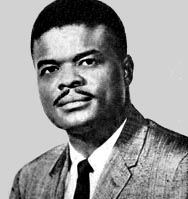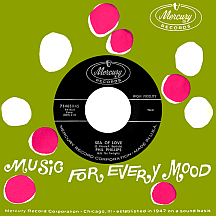PHIL PHILLIPS
Sea of Love
One singer who deserved more recognition, and success, than he ultimately achieved was Lake Charles, Louisiana native son Philip Baptiste. Possessed of a truly unusual singing voice and knack for creating heartfelt lyrical compositions, he had only one hit record in what has been a lengthy but difficult career. That hit, it turns out, is a gem familiar to most: the 1959 ode to romance called "Sea of Love."
Phil was born in 1926 and began singing at around age eight; after positive reaction to a performance in elementary school, his singleminded goal was to make music his life's profession. During his teens, he and his brothers started a gospel group they called The Gateway Quartet, which became quite popular locally. By the time he was 30 he'd been working as a bellhop at the Chateau Charles Motel in Lake Charles and was deeply taken with a woman named Verdie Mae. To illustrate his love for her, he composed a song one night on her front porch; making up the melody and playing along on his guitar, he improvised the lyrics: 'Come with me, my love...to the sea, the sea of love...I want to tell you how much I love you.' His attempts to woo her didn't work out at first, but he kept trying. A couple of years later he found another use for the song.
George Khoury, a record producer in Lake Charles, owned two labels, Lyric and Khoury's, primarily for the purpose of recording Cajun, blues and swamp pop artists. Through a mutual acquaintance, Baptiste approached him with "Sea of Love" and Khoury agreed to record it, though he gave himself a share of the writer credit. Eddie Shuler, owner of another local label, Goldband (for several decades a safe haven for Cajun acts), produced and arranged the session that featured a local band, Cookie and his Cupcakes (led by saxophonist Huey "Cookie" Thierry, the group hit big with "Matilda" in early 1959) and backing singers Phil dubbed The Twilights (different from New York's Twilights who later recorded as The Embers). Khoury didn't feel the singer had a particularly commercial-sounding name, so Baptiste became Phil Phillips.
The record came out regionally on the Khoury's label with the infectious "Juella" (one of my all-time favorite flips!) on the B side. "Sea of Love" has a hypnotic quality about it; Phil's ethereal vocals, piano and doo wop backing singers, a secular song almost churchy in its finished take. Legend tells of a disc jockey in Baton Rouge so taken with the tune that he played it repeatedly on-air and even locked himself in the studio once in defiance of his soon-to-be ex-boss. It was a lucky break for Phillips; demand ran high and Mercury Records leased the master from Khoury for national distribution. The record entered the charts at the end of June '59, gradually climbing into the top 30 in August, then in one week it made a 20-position jump to number two! Around that time the single broke at rhythm and blues stations with renewed vitality, hitting number one on the R&B charts in October. Phil toured with Dick Clark's Caravan of Stars that fall, enjoying his "overnight success" to the max!

But something was amiss, and it may have been in the fine print of Khoury's deal with Mercury. "Sea of Love" was so huge Phil received a gold record for sales of over a million copies, yet royalty payments didn't seem to align with that figure. For years afterward he complained of only receiving 6,800 dollars and not a penny more. Things went downhill from there. Throughout his two years with Mercury a total of eight singles were released, but the label showed no interest in putting out an album, something that might have helped take his career to the next level. It wasn't for lack of good material, as Phil's songwriting skills were sharp. Follow-up single "Take This Heart," backed with "Verdie Mae" (he was persistent!), a haunting acoustic guitar piece, received positive reviews but failed to catch on. Next, "Providing" was coupled with "Don't Leave Me" (another strong acoustic track with surprisingly effective whistling...you heard me right!) and fell right into the dumpster. One problem might have been that the B sides of these singles were arguably better than the A sides promoted to radio.
"What Will I Tell My Heart" (written by Peter Tinturin and Jack Lawrence in 1937, the song had been a minor hit for fellow Bayou State lifer Fats Domino in '57) marked a departure from the simpler arrangements of the first few discs; Mercury staffer Belford Hendricks arranged the session with full orchestra in an attempt at bringing about the kind of success he'd had with Brook Benton, Sarah Vaughan and Dinah Washington (Benton, as it turns out, sang backup on a few Phillips recordings, as did Elvis Presley's regular session men The Jordanaires). The song "Bubbled Under" the Billboard Hot 100 in April 1960 and for a quick minute it appeared the second hit had arrived. Then Phil Phillips dropped off the charts forever.
Four more Mercury singles were released through mid-1961, some of them with orchestral "sweetening" by Hendricks, all solid efforts thanks to Phil's intriguing way with a song. He settled into a quieter life once his contract was up, getting married (but not to Verdie Mae, who was long gone by that time) and raising seven children. He occasionally made records for small Louisiana-based companies, including "Please Forgive Me" for the Clique label of Florien, a town in the center of the state that made Lake Charles seem a teeming Metropolis by comparison. One song he'd written, "No One Needs My Love Today," came to the attention of British TV personality and singer Samantha Juste (later bride of The Monkees' Micky Dolenz) and her girl-pop rendition gained a mild following in the U.K. (where, surprisingly, "Sea of Love" had been overlooked, the hit '59 version in that country being a cover by Marty Wilde). In 1970, Phillips waxed some tracks for Lee Lavergne's Lanor label of Church Point, Louisiana, including "I Can't Live My Life Without You" and "The Evil Dope," a bizarre, preachy spoken word warning to youth that has become a favorite of cultish record collectors.
Phillips began working as a disc jockey in the late '60s, logging time at various radio stations in Louisiana and Alabama, reenergizing his world-weary music biz experience by sharing his ebullient personality with southern radio listeners. "Sea of Love" had a major revival in the '80s with Del Shannon's hit 1982 remake and, three years later, an even bigger version by The Honeydrippers (a superstar collaboration of Robert Plant, Nile Rodgers, Jeff Beck and Jimmy Page). In 1989, Al Pacino starred in the hit film Sea of Love, which featured the song and showed Pacino raving about its greatness after seeing a copy of the Mercury 45 from '59. The love for Phil's singular musical accomplishment, by the public and his peers, encouraged him to take to the stage again as a singer. "Sea of Love" and Phil Phillips continued to thrive, well into the 21st century.


